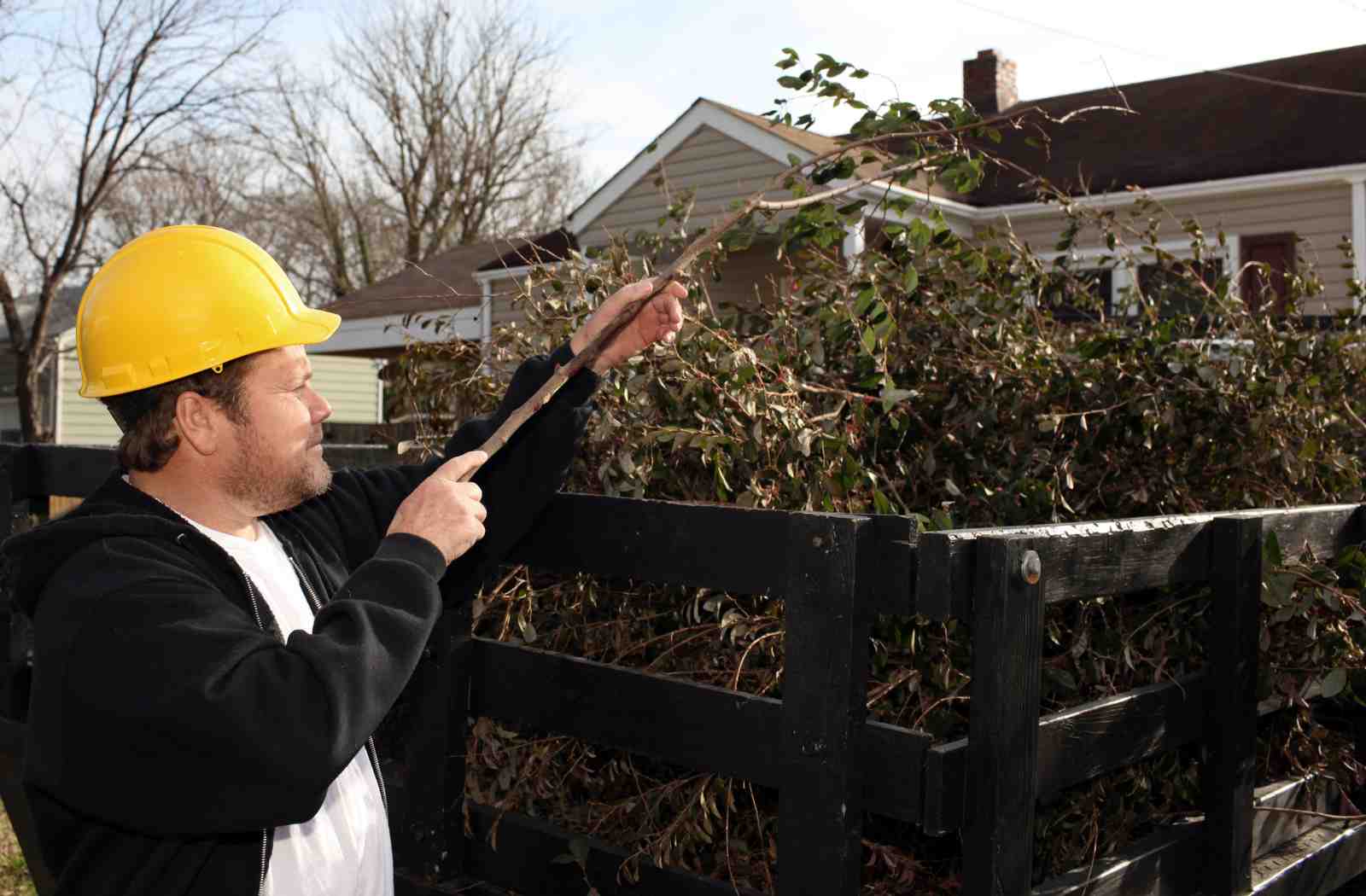Every yard owner contends with yard debris disposal. It’s a constant battle, especially during spring cleaning, fall leaf raking, or after a good trimming session. But what if you could transform this chore into an opportunity to benefit your yard and the environment?
There are many eco-friendly ways to dispose of yard debris. These methods not only reduce waste sent to landfills but also create valuable resources for your garden. Let’s explore some simple and sustainable solutions to transform your yard debris removal routine.
Embrace the Power of Nature: Let Your Grass Clippings Stay Put
Grass clippings are a prime example of yard debris that can be repurposed. Traditionally, they’ve been bagged and thrown away. However, this practice removes essential nutrients from your lawn. Here’s the good news: you can ditch the bag and embrace a more sustainable approach called “grasscycling.”
Grasscycling involves leaving your grass clippings on the lawn after mowing. These clippings decompose quickly, returning vital nutrients like nitrogen and potassium back to the soil. This natural fertilizer helps your lawn thrive without relying on chemical products. Additionally, grass clippings help retain moisture in the soil, reducing the need for frequent watering.
Here are some tips for successful grasscycling:
- Mow frequently with a sharp blade. This creates finer clippings that decompose faster.
- Avoid letting your grass grow too tall before mowing. Excessive clippings can clump and smother the lawn.
- If the clippings appear too thick after mowing, simply mow over them again to break them down further.
Turn Fallen Leaves into Fertile Friends
Fall brings a beautiful display of changing leaves, but it also creates a significant amount of yard debris. Don’t reach for the rake just yet! Fallen leaves can be a valuable asset to your garden.
Leaves are a natural source of mulch, a material that provides numerous benefits for your plants. Mulch helps suppress weeds, retain moisture in the soil, and regulate soil temperature. Here’s how to transform fallen leaves into a helpful friend for your garden:
- Shred the leaves: Use a lawn mower or leaf shredder to break down the leaves into smaller pieces. This allows for faster decomposition and better penetration into the soil.
- Create a leaf pile: Designate a specific area in your yard for a leaf pile. This provides a cozy habitat for beneficial insects, pollinators, and small creatures over the winter months.
- Spread the shredded leaves as mulch: Apply a layer of shredded leaves around your plants and trees, leaving a few inches of space around the base to prevent rot.
Branch Out with Composting: A Recipe for Rich Soil
Yard debris such as twigs, branches, and vegetable scraps can be transformed into a nutrient powerhouse called compost. Composting is the natural process of organic materials breaking down into a rich, dark soil amendment.
Compost provides a multitude of benefits for your garden:
- Improves soil structure: Compost loosens compacted soil, allowing for better drainage and aeration.
- Enhances soil fertility: Compost adds essential nutrients to the soil, promoting healthy plant growth.
- Reduces reliance on fertilizers: With compost in your soil, you may need less commercial fertilizer.
Here’s a basic guide to starting your own compost pile:
- Choose a location: Select a well-drained area in your yard that receives partial shade.
- Mix brown and green materials: Brown materials like leaves and twigs provide carbon, while green materials like vegetable scraps and grass clippings provide nitrogen. Aim for a balanced mix of both.
- Maintain moisture and aeration: Keep your compost pile moist but not soggy. Turn the pile regularly to ensure proper aeration.
Consider Community Yard Debris Disposal Programs
If you have a large amount of yard debris that you can’t manage on your own, consider checking with your local community programs. Many cities and towns offer curbside yard debris collection services.
These programs collect yard debris and transport it to composting facilities where it’s transformed into valuable compost. This is a convenient and eco-friendly way to dispose of your yard debris while contributing to a sustainable community program.
Repurpose and Reuse: Get Creative with Yard Debris
Yard debris doesn’t always have to be composted or mulched. With a little creativity, you can find new uses for these materials. Here are a few ideas:
- Create a brush pile: Sturdy branches can be used to build a brush pile, providing shelter for wildlife in your yard.
- Make decorative edging: Use small branches to create a natural border around your flower beds.
- Build a raised garden bed: Sturdy branches can be used as a framework for raised garden beds.
Embrace Sustainability: Small Steps, Big Impact (continued)
By adopting these eco-friendly practices for yard debris disposal, you’re not just making your life easier; you’re making a positive impact on the environment. Here’s a closer look at the benefits:
- Reduced Landfill Waste: When you compost, mulch, or reuse yard debris, you divert it from landfills. Landfills take up valuable space and contribute to methane emissions, a potent greenhouse gas.
- Improved Soil Health: By returning organic matter to the soil through composting and mulching, you contribute to a healthy and thriving ecosystem within your yard. Healthy soil promotes better plant growth, reduces erosion, and retains more water.
- Conservation of Resources: Compost acts as a natural fertilizer, reducing your reliance on chemical fertilizers produced using energy-intensive processes. Additionally, using mulch helps retain moisture in the soil, minimizing the need for frequent watering.
Beyond the Basics: Additional Tips for Eco-Friendly Yard Care
While yard debris disposal is a crucial aspect of sustainable yard care, there are other steps you can take to create an eco-friendly haven:
- Choose native plants: Native plants are adapted to your local climate and require less water and maintenance compared to non-native species.
- Attract pollinators: Plant flowers that attract butterflies, bees, and other beneficial pollinators. These creatures play a vital role in the health of our ecosystem.
- Practice water conservation: Use water-efficient irrigation methods and consider planting drought-resistant plants.
- Minimize pesticide use: Opt for natural pest control methods whenever possible. This protects beneficial insects and promotes a healthy ecosystem.
Conclusion
Transforming your yard into an eco-friendly space doesn’t have to be overwhelming. By incorporating these simple practices for yard debris disposal and adopting sustainable yard care principles, you can contribute to a healthier environment, one yard at a time. Remember, even small changes can make a big difference. So, embrace the power of nature, get creative with your yard debris, and watch your yard flourish in a sustainable way!





